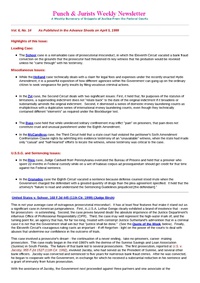When the defendant in this case was sentenced, the sentencing judge did not orally articulate the standard conditions of supervised release, but the written Judgement and Commitment Order included fourteen requirements listed as "standard conditions" in U.S.S.G. § 5D1.3(c). The defendant therefore moved to strike those conditions because of …
Here the Court ordered the district court to disclose to defense counsel a Government debriefing report that had been filed in camera even though both the district court and the Government said they would not rely on it.
In this case, the Government refused to file a motion …
To help put the label of "ineffective assistance of counsel" in context, there ought to be a similar label for "ineffective rulings by judges." The reason is that, while judges seem to survive unscathed when they issue an erroneous ruling about the indecipherable and convoluted Federal Sentencing Guidelines (an …
This is a significant case that explores two important issues. The first was whether a superseding indictment "relates back" to the filing date of the original indictment for the purposes of the statute of limitations. It has long been the law in the Second Circuit that a superseding indictment …
Relying heavily on the decision in U.S. v. Arana, 18 F.Supp.2d 715, 718 (E.D.Mich. 1998), the Court cited with approval Arana's reasoning that: "[t]he prosecutor is not 'giving' anything; in the Rule 11 agreements at issue here, the Government has simply agreed to recommend reduced sentences. It is a …
In this case, Judge Caldwell reaffirmed his original decision (on different grounds) and ordered the BOP to grant the petitioner credit against his Federal sentence for 22 months spent in Federal custody while on a writ ad prosequendum.
The issue raised in this case was whether a prisoner …
In theory, this case is about the recently enacted Hyde Amendment, a statute that allows criminal defendants to recover attorneys' fees in cases where the court finds that the prosecutor acted vexatiously, frivolously or in bad faith. That statute, which is presently found at 18 U.S.C. § 3006A, Note, …
Here the Court affirmed a three-level official victim enhancement under § 3A1.2, finding the threats were motivated by the intended victim's position.
The defendant appealed his sentenced following his plea of guilty to making false statements within the jurisdiction of the federal government, claiming that the district court …
Citing Pennsylvania's "casual" and "half-hearted" efforts to locate a critical witness in this case, the Third Circuit held that the state court had violated the petitioner's Sixth Amendment Confrontation Clause rights by admitting into evidence at trial a statement made by that witness at a preliminary hearing, on the …
In its ruling the Court relied on its previous holding in U.S. v. Murphy, 65 F.3d 758, 762 (9th Cir. 1995) that "the government cannot refuse to file such a motion on the basis of an inconstitutional motive . . . or arbitrarily (I.e., for reasons that are not …
The great Russian novelist Fydor Mikhailovich Dostoyevsky once wrote "the degree of civilization in a society is revealed by entering its prisons." F. Dostoyevsky, The House of the Dead 76 (C. Garnett trans., 1957). Apropos that comment, the Eleventh Circuit held in this case that, while unrelieved solitary confinement …
QUOTE OF THE WEEK - Getting convictions by striking "foul blows."
"The United States Attorney is the representative not of an ordinary party to a controversy, but of a sovereignty whose obligation to govern impartially is as compelling as its obligation to govern at all; and whose interest, therefore, …
The Court explained the "mandate rule" by stating that its basic tenet is that a district court is bound by the scope of remand issued by the court of appeals. It also exolained that, under 28 USC § 2106, the courts of appeal have broad discretion to issue general …
This is not your average case of outrageous prosecutorial misconduct. It has at least four features that make it stand out as a significant case in American jurisprudence. First, A.U.S.A. Lothar Genge clearly exhibited a brand of insolence that - even for prosecutors - is astonishing. Second, the case …
When the defendant in this case was sentenced in this case, the sentencing judge did not orally articulate the standard conditions of supervised release, but the written Judgement and Commitment Order included fourteen requirements listed as "standard conditions" in U.S.S.G. § 5D1.3(c). The defendant therefore moved to strike those …
This is a significant case that explores two important issues. The first was whether a superseding indictment "relates back" to the filing date of the original indictment for the purposes of the statute of limitations. It has long been the law in the Second Circuit that a superseding indictment …
In the first decision of its kind in the Second Circuit, the panel in this case held that "in exceptional circumstances, a district court has the authority under U.S.S.G. § 5K2.0 to grant a downward departure on the basis of a defendant's consent to deportation even in the absence …
In this case, the Court held that a reliable informant's tip that he had seen the defendant three days earlier in a particular apartment with cocaine did not provide probable cause for a search warrant and that the good faith exception did not apply. Thus, the panel reversed the …
